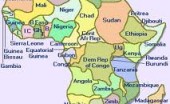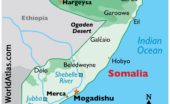Molly Minturn - My family is heartbroken to share that my father died in surgery on Monday, Feb. 10. It…
Somalia
Written by Diana Thebaud Nicholson // July 18, 2011 // Africa, Geopolitics // Comments Off on Somalia
NYT Somalia Archives
BBC Somalia Q&A:
Somalia has experienced almost constant conflict since the collapse of its central government in 1991.
It was hoped the election of moderate Islamist Sheikh Sharif Sheikh Ahmad as president of a transitional government in January and the departure of Ethiopian troops would stop the violence, but Islamist insurgents are keeping up their almost daily attacks.
UN resumes Somali aid after militia softens stance
The United Nations, in an effort to slow the exodus of Somalis compelled to leave their homes because of famine, last weekend delivered humanitarian assistance to refugee camps controlled by the Islamist militant group, al-Shabaab, for the first time in a year and a half. The Independent (London) (7/18), BBC (7/17)
New Somali prison, backed by UN, will house pirates
A high-security prison financed by the UN has opened in Somalia, in the breakaway northern region of Somaliland, in order to house convicted and suspected pirates operating off the country’s coast. “We can find countries to prosecute [pirates], but no one wants non-nationals in their prisons for too long. We are looking at the regions of Somaliland and Puntland to take back their own nationals,” said a UN official. Bloomberg (3/29)
2010
9 September
U.S. Marines Rescue Ship From Pirates
U.S. Marines early Thursday boarded and seized control of a German-owned commercial vessel that had been commandeered by pirates, in what appeared to be the first American-led military boarding of its kind amid a recent surge of attacks in the Gulf of Aden and along the east coast of Africa.
Insurgents go after Somali pirates
In a move that pits two of the fiercest fighting groups in East Africa against one another, the Somali militant group Hizbul Islam seized the pirate cove of Xarardheere, potentially placing a claim on the lucrative piracy trade before other military groups, such as al-Shabaab. Though neither Hizbul Islam nor al-Shabaab has displayed any piratical tendencies, maritime experts believe that Somali pirates have earned more than $100 million in ransoms — an irresistible income in a country with virtually no economy. AlertNet.org/Reuters (5/2) , The Independent (London) (5/3) , The New York Times (5/2)
1 May
Bombs Hit Mosque in Somalia’s Capital, Killing Dozens
Dozens of people were killed in a rare mosque bombing in Mogadishu, in what may be a sign of increased bloodletting between Islamist insurgent groups.
5 April
South Korea destroyer reaches tanker seized by pirates
(Reuters) – A South Korean navy destroyer has caught up with a supertanker hijacked by pirates that is cruising toward the Somali coast with a cargo of crude oil worth as much as $170 million, an official said on Tuesday.
The South Korean-operated, Singapore-owned Samho Dream, which can carry more than 2 million barrels of crude, was seized on Sunday en route from Iraq to the United States, in the latest sign the sea gangs are targeting bigger quarry.
24 March
Somali Backlash May Be Militants’ Worst Foe
As Somalia’s government gears up for an offensive, the population is turning against the Islamist militants.
22 October 2009
Busy days for pirates
(CNN) Somali pirates attacked two ships within minutes of each other off the coast of East Africa today. A group of pirates took control of a Panamanian-flagged vessel near the Seychelles. Shortly after that pirates began firing on an Italian ship off the Kenyan coast, though that attack was thwarted by a nearby Belgian warship.
A foreign ministry spokesman said that China would make “all-out efforts” to rescue the crew of a Chinese ship captured by pirates on Monday, though experts said the government would likely negotiate for the ship’s release. The attack — over 700 miles off the Somali coast — may show that pirates are traveling farther afield to avoid the growing international naval fleet in the Gulf of Aden, their traditional hunting ground. A report released Wednesday by the International Maritime Bureau shows more pirate attacks in the first nine months of this year than all of last year. However, thanks to the increased military presence in the area, the number of successful attacks has gone down.
Postcard from Somali pirate capital
President Abdirahman confirmed that the entire annual government budget for Puntland was “about $20m (£12m)”. But although piracy is clearly a major headache for the local authorities, and for coastal communities in Puntland, Mr Abdirahman sought to put it in context. At a cabinet meeting, the focus was on the wider conflict gripping Somalia, and the widespread fear that Islamic militants in the south could seize control in the capital Mogadishu and then threaten Puntland. “From the international point of view, piracy may be considered the number one issue,” said Mr Abdirahman. “But from our point of view it is a tiny part of the whole Somali problem – a phenomenon prompted by the collapse of the Somali state.”
25 May
Chasing the Somali piracy money trail
Piracy off the coast of Somalia has made many people very rich. A new economy has developed both within Somalia and further afield, as security companies, lawyers and negotiators reap huge profits from their involvement. But finding out what happens to the money delivered as ransom payments is doubly difficult, first because piracy is a transnational crime, and second because Somalia is a country without rules, regulations or a functioning government. Somali gunmen ‘renounce piracy’
24 May
Today in Piracy: HMCS Winnipeg on ‘hot streak’ off Somalia
… the weapons seizures marked a very successful day for the Canadian frigate, which has been a constant thorn in the side of the Somali pirates that hunt merchant vessels in this, one of the world’s busiest shipping corridors.
Deadly bombing hits Mogadishu base
(Al Jazeera) Thousands flee Somali capital amid fighting between government forces and opposition.
23 May
For Somalia, Chaos Breeds Religious War
In the past few months, a new axis of conflict has opened up in Somalia, an essentially governmentless nation ripped apart by rival clans since 1991. Now, in a definitive shift, fighters from different clans are forming alliances and battling one another along religious lines, with deeply devout men on both sides charging into firefights with checkered head scarves, assault rifles and dusty Korans.
It is an Islamist versus Islamist war, and the Sufi scholars are part of a broader moderate Islamist movement that Western nations are counting on to repel Somalia’s increasingly powerful extremists. Whether Somalia becomes a terrorist incubator and a genuine regional threat — which is already beginning to happen, with hundreds of heavily armed foreign jihadists flocking here to fight for the Shabab — or whether this country finally steadies itself and ends the years of hunger, misery and bloodshed may hinge on who wins these battles in the next few months.
8 May
For Somali Pirates, Worst Enemy May Be on Shore
For the first time in this pirate-infested region of northern Somalia, some of the very communities that had been flourishing with pirate dollars — supplying these well-known criminals with sanctuary, support, brides, respect and even government help — are now trying to push them out.
Grass-roots, antipirate militias are forming. Sheiks and government leaders are embarking on a campaign to excommunicate the pirates, telling them to get out of town and preaching at mosques for women not to marry these un-Islamic, thieving “burcad badeed,” which in Somali translates as sea bandit.
22 April
Terrorists, Pirates and Anarchy, Somalia Style
Somalia has become the poster child for transnational threats emanating from Africa. By sea, pirates much more dangerous than their predecessors from centuries past prowl the Indian Ocean and Red Sea waterways and extort tens of millions of dollars in ransom. By land, extremist militias connected to al-Qaeda units ensure that Somalia remains anarchic and the only country in the world without a functioning central government.
15 April
Piracy symptom of bigger problem
By Roger Middleton, [coordinator of] a new project at the think-tank Chatham House investigating the economic dimensions of conflict in the Horn of Africa.
(BBC) Somalia is one of the poorest, most violent, least stable countries anywhere on Earth. It suffers from severe drought and its people face hunger and violence on a daily basis. This is not a new situation, Somalia, especially the south, has been in this state for many years. The risks associated with piracy can be seen as little worse than those faced every day. What is new is that the world is now once again concerned with the goings on of this collapsed state. Somalis have learnt to live in circumstances under which many might be expected to give up. In the face of overwhelming adversity they have created thriving businesses, operating entirely in the informal sector, and hospitals built and maintained with money sent home by the diaspora. However, people who have been forgotten by the world and who hear of toxic waste being dumped on their beaches and foreigners stealing their fish have difficulty being concerned when representatives of that world are held to ransom.
11 April
Somali Pirates Hand Obama Foreign Policy Emergency With No Easy Solution
(Fox News) Other foreign threats may pose greater concern for national security, but the problem of Somali pirates is proving just as difficult to address There are no easy solutions — as has been made clear in numerous cases over the past year with the threat of piracy off the coast of Somalia escalating. The difficulty was proven again Friday when the French navy stormed a hijacked yacht, taking back the boat but costing the life of one hostage.
April 2009
The Pirate Latitudes
(Vanity Fair) When the French luxury cruise ship Le Ponant was captured by a raggedy, hopped-up band of Somali pirates last spring, in the Gulf of Aden, it looked as if the bandits had bitten off more than they could chew. But after a week-long standoff, they got what they had come for—a $2.15 million ransom. Describing the terrifying attack, the ordeal of the ship’s epicurean crew, and the tense negotiations, the author examines the ruthless calculus behind a new age of piracy.
14 January 2009
Ethiopians Withdraw From Key Bases
It appeared to be the end of two years of bloody Ethiopian intervention in this chaotic nation. Hundreds of cheering Somalis lined the streets to watch the dozens of Ethiopian military trucks rumbling out of Mogadishu, Somalia’s bullet-pocked capital.
12 November 2008
Islamist Insurgents Take Somali Port City Without a Fight
The Islamists are now in control of a large and rapidly growing swath of south-central Somalia, and the weak transitional government seems too paralyzed by infighting to do much about it.
The government, which is recognized internationally and backed by Ethiopian troops, has repeatedly urged the United Nations to send in peacekeepers to quell the insurgency and stabilize the country. But with the continuing conflicts in eastern Congo and the Darfur region of Sudan, another major international peacekeeping effort in the region seems unlikely at the moment.



